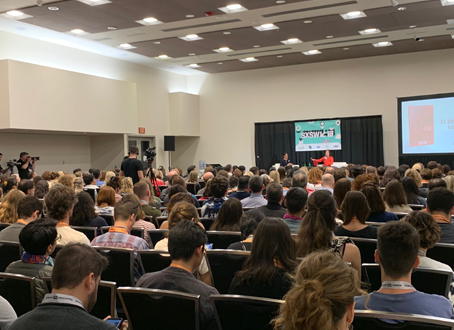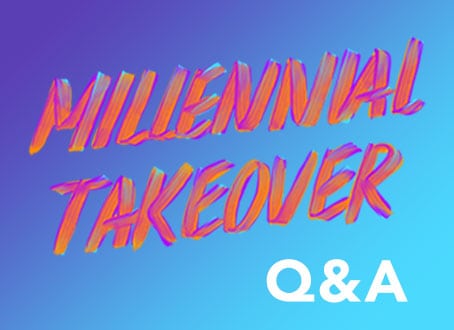Over the past two years, we have focused a large part of our efforts to move impact investing from niche to mainstream on building awareness of the investors and entrepreneurs who are harnessing the power of the capital markets to provide financial and social returns. Last year, we published the Short Guide to Impact Investing, and we partnered with Entrepreneur.com to bring “Profiles of Impact” to their readers. But we realized that one of the most powerful things we could do to build awareness was to go to the most influential storytellers – the journalists we rely on to bring us the news and highlight the most important developments in our world today.
That’s why last week, at the Impact Hub NYC, the Case Foundation and Arabella Advisors co-hosted a gathering for more than 100 journalists and communicators to discuss impact investing and social enterprise. The group heard from leading social entrepreneurs and investors about the opportunities and challenges in this growing field.
There are many definitions applied to the terms “social enterprise” or “impact company,” which are often used interchangeably. However, our CEO, Jean Case, offered one broad definition at the outset of the day. She defined a social enterprise as a company that has the intent to produce a social good, that commits to measure progress toward its goals, and that practices transparency in sharing its findings.
Here are few themes that ran through the day’s conversations. And, for more context, be sure to take a look at the Storify that we created with tweets from the day.
Optimism that Business Can (and Should!) Be a Force for Good
Neil Blumenthal, whose company Warby Parker provides affordable, stylish prescription eyewear and incorporates a Buy One, Give One model, set the stage at the beginning of the day when he said, “I hope we don’t live in a world where I have to justify every good deed by a profit motive.” Neil’s sentiments echoed those made by a number of CEOs recently, including Howard Schultz of Starbucks, Tim Cook of Apple, and Mark Zuckerberg of Facebook, who have all told shareholders who questioned their actions related to sustainability and responsible business that they should get out of their stock.
Jean agreed with Neil, and noted that for too long in America, business leaders had only one goal – to provide financial returns to their shareholders. ImpactAlpha’s David Bank echoed her comments later in the day when he said, “there’s a god we’re all supposed to worship named ‘Risk Adjusted Market Rate Return.’” “But,” Jean said, “that sentiment is changing,” and investors are starting to look at the concept of return more broadly.
Clara Miller, who led the F.B. Heron Foundation’s charge to direct all assets (including its endowment) to social good, supported this feeling when she said, “It can’t just be that one side shovels out problems as fast as it can, and the other side is the cleanup crew.” However, no one at the event suggested that business should replace philanthropy, nonprofits or government. Instead, as Justin Rockefeller, a Trustee of the Rockefeller Brothers Fund and a founder of the ImPact said, “it is one of many tools in our toolbox to tackle social challenges.”
Financial and Social Returns are Possible
Over the course of the day, we heard regularly from investors and entrepreneurs that it is possible to make positive financial returns from investments in social enterprises. Andrew Kassoy, Co-Founder of B Lab, thinks that we’re seeing a real shift in the potential for impact businesses to grow. He said “we live in a time where you do well because you’re doing good.”
Shazi Visram, the Co-Founder and CEO of organic baby food brand Happy Family, which sold to Danone in 2013, says that hers is a great story for two reasons: “because the company changed the baby food market for the better and at the same time made investors a lot of money.”
The investors were also bullish on the sector. Amy Bell, Executive Director of Social Finance at JPMorgan, said that she’s found impact investing to be good for business. She said that JPMorgan’s “Aha!” moment came when clients kept asking for impact investing advice and products that provided market rates of return. This enabled her to scale the practice to meet client needs. Ommeed Sathe, who in his role of Vice President for Impact Investments at Prudential is leading the creation of a $1B impact portfolio, said that socially responsible investments are crucial to creating a diverse portfolio that delivers long-term value for shareholders.
The returns aren’t limited to investors. Tim Newell, Vice President of Financial Products at SolarCity, provided some important context of the potential of clean energy to benefit the U.S. economy. In 2014, he said, one in every 78 jobs added in the United States was related to solar. He also predicted that in 2015, the solar industry would add eight times as many jobs as the oil, gas and coal industries combined. His bullish forecast shows that there’s real potential for the industry not only to contribute to a cleaner planet, but also to create jobs and growth in the United States.
So, it’s not only “cool to care,” as Neil Blumenthal said. Responsible investing can also make investors money and contribute to healthier, wealthier communities.
The Story’s Not Finished Yet—and It’s Ours to Write
Catherine Clifford, who is a Senior Writer at Entreprenuer.com, asked each of the social entrepreneurs on her panel how they tell the story about their organizations and about why this growing sector matters. The panelists stressed that that many stories needed to be told—the story of impact and disruption, the story of profits, the story of fearless investors, and the story of changing business for better across the United States and the world.
Matt Bishop, the Globalisation Editor at The Economist—whose 2008 book, Philanthrocapitalism, was ahead of its time in calling for private sector solutions for social problems—summarized why impact investing and social enterprise are so interesting. He said, “this is a fantastic story, but we don’t know the ending yet.”
We hope to continue the conversation about social enterprise and impact investing to create the story together, and we hope that you will join us. Please follow @CaseFoundation on twitter for updates and upcoming events.





